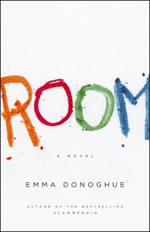
Room by Emma Donoghue offers the not-faint-of-heart reader the hermetic and troubling conceit of living inside the head of a five-year-old boy who has only known captivity in an eleven-foot-square shed. That captivity is shared with his mother, who has been in what the child Jack calls Room for seven years. She resourcefully manages to make their confined world one of surprising vibrance and great affection. Their existence is periodically interrupted by visits from his Ma’s captor, but the child is largely shielded from those visits and interaction with that menacing visitor, as much as is possible in the constrained space of that tiny world.
It isn’t really a spoiler to reveal that the child and his mother eventually manage to escape Room. It’s perhaps more of a spoiler to give away how happy (or not) they are to escape and return to (in the mother’s case) and enter for the first time (in Jack’s case) the Outside world. The greatest strength of this book is that it is imbued with the authentic voice of a child, spiked with idiosyncrasies both normal for the narrator’s age, and with those which could be reasonably and realistically attributed to his unusual upbringing, such as precocious vocabulary or other more developmentally stunted perceptions. The question of whether the book strains what is believable and unbelievable can simply be set next to recent headlines for such real-life stories as those of Elisabeth Fritzl and Jaycee Dugard. The question of whether the book strains what is and isn’t possible is answered step by step with logical explanations for how Ma and Jack are kept confined and isolated. So then, the book is plausible and sound in terms of premise, structure and tone. So why does it so strain then with respect to emotional resonance … or at least strains so for this reader? Quite simply, if Donoghue had said less, with fewer detailed and sometimes rambling specifics, the book would have had greater emotional depth and appeal. Jack’s various experiences of and observations of the Outside world, while clever, undoubtedly well researched and offering new perspectives on mundane day-to-day things that we all take for granted, quickly become overkill. It likely replicates the sensory overload that Jack also experiences, but it’s just tedious for the reader. By the time Jack stumbles across some TV commentators analyzing what he symbolizes, the profundity of what he and his mother have gone through has been hammered home too hard and verges into reality TV territory – which, sadly, the real-life versions of this story do, too. It doesn’t make these episodes any less appalling or heartwrenching, but it makes you want to shut them all off. Yes, Room pushes all the right buttons, but that’s just it: I felt like my buttons were being pushed, and I resisted. It’s perhaps hokey to say in a review that you really wanted to like a book or movie or whatever (and heaven knows I’ve said it before). I *did* want to like Room and maybe had expectations I would based on the wave of glowing reviews (blog/tweet/civilian as well as media/industry), literary award nominations and outrage at nominations some felt this book additionally deserved. Many euphoric reviews led me to believe that I would be up all night reading this book in one gulp, regardless of how I felt, but that wasn’t my experience. I found myself labouring to finish it, even bored at times. I appreciate the obvious craft and thought and careful validation that went into this book, but a more impressionistic and less specific account would have left room for the reader – reader by reader, to each reader’s capacity and taste, to flesh it out in an emotionally authentic fashion. Perhaps Donoghue’s choice of narrator doesn’t make that possible however, as extraordinary young Jack is wired by his age and experience to report everything copiously and literally.
Pingback: 2010 reading list – not best of, but all of … | bookgaga
this is what I’m worried I’m going to think, too.